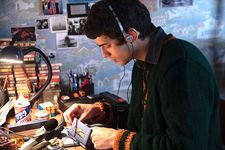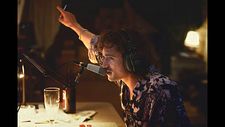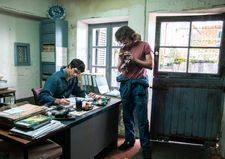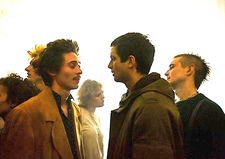Vincent Maël Cardona’s Cannes Film Festival and César Award-winning Magnetic Beats (Les Magnétiques, co-written with Chloé Larouchi, Maël Le Garrec, Rose Philippon, Catherine Paillé, and Romain Compingt), stars Thimothée Robart (Most Promising Actor Lumière Award-winner) with a first-rate supporting ensemble, including Marie Colomb, Joseph Olivennes, Antoine Pelletier, Philippe Frécon, Brian Powell, Olga Créancier-Werckmeister, Mathilde Bisson, and the director himself.
 |
| Philippe Bichon (Thimothée Robart), sound engineer for Radio Warsaw |
Remembering Ian Curtis (with Joy Division’s Decades and Warsaw); David Bowie and Brian Eno’s Warszawa; Jon King in Gang of Four (Damaged Goods) and Camera Silens (Réalité); The Undertones (Teenage Kicks), Robert Görl (Dit Mir), a nod to John Peel and Bob Marley; noting The Pop Group and The Slits; Edith Nylon (seen in Philippe Puicouyoul’s La Brune Et Moi), and more, were brought up in Vincent Maël Cardona’s tête-à-tête with music producer (of Bush Tetras, ESG, Liquid Liquid, Glenn Branca) and 99 Records founder Ed Bahlman on capturing the soundscape of the late Seventies and early Eighties.
It is election night in France May 1981. On a restaurant TV, François Mitterand is declared the winner with bells chiming in hopes of a new, bright future. In the midst of celebration taking place in the rural North of France, we are introduced to our reserved protagonist and occasional narrator from the future, Philippe Bichon (Thimothée Robart). His older brother Jérome Bichon (Joseph Olivennes) is the host of their homemade broadcast called Radio Warsaw in their tiny town, with Philippe as the sound engineer.
Jérome’s new girlfriend Marianne (Marie Colomb) from Paris has a little daughter Rita (Olga Créancier-Werckmeister) and is in training to be a hairdresser in the local salon. Philippe’s fascination with Marianne grows stronger and stronger but remains unexpressed to her. The two brothers live together with their father (Philippe Frécon) in a big house with wild floral wallpaper in the corridor and a few remnants of a female presence, the only signs of a mother who left. Theirs is a male world and Philippe has yet to figure out what that means for him.
 |
| Jérome Bichon (Joseph Olivennes) about to play Joy Division’s Decades on Radio Warsaw |
When the obligatory military service looms, he tries to get out of it. Unsuccessfully it turns out, as he is tricked by the official psychiatrist, played cheekily by the director himself. Consequently, our hero is shipped off to the French sector of the then still divided Berlin, where his obsession with sounds and music and Marianne finds a new playground.
In the barracks he meets Edouard (Antoine Pelletier) who lures Philippe out of his shell and introduces him to Dany (Brian Powell), the host of a British military radio station, where Le Frog (so his new nickname) makes quite a splash with his musical and technical prowess. Silence and screams and what lies beyond the spoken word, the path given and the path taken, Magnetic Beats is a brilliant film showing us the spiralling around an emptiness that cannot yet or no longer be named.
From Paris, after returning from Series Mania in Lille, where episodes of his new project for ARTE, Haven of Tears, were shown (Margot Bancilhon won Best Actress), Vincent Maël Cardona joined Ed Bahlman and me for an in-depth conversation on Magnetic Beats.
 |
| Philippe (Thimothée Robart) with his brother Jérome (Joseph Olivennes) at their father’s garage |
Anne-Katrin Titze: Hi, good to see you! You are in France right now?
Vincent Maël Cardona: Hi, yes, I’m in Paris right now because I’m finishing a new project, a series for Arte. It’s six episodes. The shoot was from August 8 to November 20. Now I’m finishing the post-production. We just showed the first two episodes at Series Mania in Lille.
AKT: Is that the one with Olivier Gourmet?
VMC: Yeah, exactly!
AKT: How are things in Paris with the strikes? We see the footage on the news here and the city looks completely in chaos!
VMC: On fire! Actually I think it’s alright. I’m not striking myself right now. I think it’s way more under control here than the images let you think it is. Still it’s a complicated moment on a political level here in France.
AKT: I have someone here to say hi and talk about the music, Ed Bahlman of 99 Records, who knew this time you set Magnetic Beats in very well and who was in awe how you captured the music.
 |
| Marianne (Marie Colomb) giving Philippe (Thimothée Robart) a haircut at Élysée Coiffure |
VMC: Great!
AKT: Here’s the music expert!
VMC: Hello Ed! Hi!
Ed Bahlman: It brought me right back to the late Seventies early Eighties, your film!
VMC: Oh, thanks!
EB: I knew all these musicians. Also in West Berlin. The scene when he is cleaning off the tables and on comes from the cassette in the Walkman [Gang of Four’s] Damaged Goods and you had him jump on the table! Is that a tribute to Jon King, the singer?
VMC: Yes it is and in this scene there is a sort of carriage between Damaged Goods and also this French punk band right before, called Camera Silens [Réalité].
EB: I don’t know them.
VMC: Because it’s a time where you have pretty big bands but in France you also have a lot of very small punk bands that were crazy marvellous genius. I like to make associations of small geniuses and big geniuses.
 |
| Philippe (Thimothée Robart) in the military |
AKT: That’s lovely.
EB: Another great moment is that sound piece for the radio for Marianne. That creation was brilliant and then Teenage Kicks kicks in. I have it right here, signed by all of them.
VMC: Right! That’s crazy. There’s a few scenes like this in the film, but the one you are talking about especially was where the sound came first. Then we imagined the images and we put images on the time track. We started with the creation of the sound. Our character, Philippe, has to find his way to express himself. At this moment he cannot use words. He uses sound.
EB: And his body!
VMC: And his body and the technology, analogue technology. And of course I try to use cinema, which is equally sound and image. That was a centre scene.
EB: Also in the opening, using the music in your lovey tribute to Ian Curtis. He killed himself the day before Joy Division was going to come to America.
VMC: Oh I didn’t know that! It was just before?
EB: Yes, and the person who was working on the tour was a dear friend of mine, Ruth Polsky. I had a shop also besides a record label on MacDougal Street in the West Village. She came to the shop crying because Rob Gretton, the manager, also when they became New Order, left a phone message that Ian had killed himself and the tour is off.
 |
| Vincent Maël Cardona on Philippe’s (Thimothée Robart) radio message Marianne: “At this moment he cannot use words. He uses sound.” |
VMC: I still can’t imagine how young Ian Curtis was when he died [23]. When you see what he has done in such a short period of time. We were talking about Rimbaud [in the next installment]. It makes me think of those prodigies who died very young, almost child, and how they were too far in a way. When I hear the voice of Ian Curtis, still now, I hear the No Future thing.
I hear our times that we are in now. I mean the real concrete problem of the extinction of our species. This No Future is not poetry anymore. It’s like they saw it like a prophecy. This homage at the beginning of the film for me is to set the tone, the note. The note was that some of the edgiest people of that time saw where everything was going to drift.
EB: It’s brilliant that you chose a song that’s not one of their well-known ones.
VMC: That’s the little happiness of making films - that you can choose music and maybe share some music that is very dear to you. This one is very special to me - the young men and the weight on their shoulder.
EB: It sets the tone for your lead character also.
VMC: Totally. You know how music is about presence. When you hear a record you hear the instruments, the little defaults, the voice. I mean, they were there. It’s like a bridge with the past. Sound in general is about air, packs of air that come in your ear. So this has to do with touching. Touch with the reality, a feeling of being there, of recreating an atmosphere.
 |
| The Undertones signed 7" by the band, collection Ed Bahlman Photo: Anne-Katrin Titze |
EB: And one of their albums was called Atmosphere!
VMC: Yeah, I know, of course.
EB: It’s the vibrations to the inner ear. Did you know the work of the composer Glenn Branca?
VMC: No, I know the name but I’m not very familiar with his work.
EB: I produced Branca’s first recordings, Lesson No. 1 (99-01EP) in 1980 and in 1981 The Ascension album (99-001LP).
VMC: I should check it out!
EB: Also the German music you chose - Robert Görl - he was everywhere at that time.
VMC: Totally - for me Robert Görl was the first music I was thinking of when we were writing the script, even before Joy Division, for instance. It was more accurate about what I wanted to tell. Maybe because he’s German.
EB: I have one more thing about the music - the great casting of Dany. He was so natural, like your John Peel.
VMC: They showed me files of extra and I saw a tape and he made me think of John Peel. We wanted a voice, because he’s a radio man. He had this relaxed thing and a little smile, something really British I love. Like nothing is really serious. It was his first role in cinema.
 |
| Marianne (Marie Colomb) with her daughter Rita (Olga Créancier-Werckmeister) |
EB: He was very playful. And Edouard even kept on the name for his friend Philippe, the Frog. Also how you slipped in Bob Marley. Mentioning him and then in the sound piece isn’t that Marley also?
VMC: Yes, totally. We had to have a little reggae touch. It’s very tiny, but it’s there. It was so important as an influence.
EB: Absolutely.
VMC: Also it was the disk that was there, it’s not a choice, it was there. The music we were listening to at this time.
EB: There’s one group that gets mentioned with The Pop Group and The Slits, one that I’d never heard of. Who are Frantic Palms?
VMC: Oh, Frantic Palms! That’s one of those bands at that time, there were so many. Even now we’re digging up some bands we never heard of before. Another name, have you ever heard of Edith Nylon?
EB: No.
VMC: There are hundreds of crazy names that are still now huge music for our time.
EB: When I used to do shows in Paris, we performed at the Rex Cinema. I also produced Liquid Liquid.
VMC: Wow!
EB: And ESG.
 |
| Vincent Maël Cardona with Ed Bahlman (Glenn Branca - The Ascension LP) and Anne-Katrin Titze: “I should check it out!” Photo: Anne-Katrin Titze |
VMC: Yeah, huge.
EB: Did you ever hear of Bush Tetras?
VMC: No, I don’t think so.
EB: Too Many Creeps?
VMC: Of course!
EB: That’s them.
VMC: What’s crazy, I’m between the analogue world and the digital one. The actors of the film, they are all from the digital world. It struck me that they have a huge knowledge of the music culture because with the internet, the digital possibilities, they offered me a lot of references I hadn’t even heard of.
EB: That’s why I brought up Glenn Branca. When I recorded at Power Station we were in a studio that wasn’t finished, there was no sound buffering. Freddie Mercury [with David Bowie] and Diana Ross were using the other two main recording studios when I was doing Glenn Branca, an unknown composer at the time.
 |
| Edouard (Antoine Pelletier) plotting with Philippe (Thimothée Robart) |
By accident, Diana Ross’s breakfast got sent to our studio. That’s how we knew that she was there. They had the analogue tubes and that’s what I decided to use, and not the most modern in 1981. Power Station was the number one recording studio in New York. I just looked through my archives and I have the first Joy Division EP here right now. One of their tracks is called Warsaw is that why you call it Radio Warsaw?
VMC: Yes of course!
EB: And this is the Glenn Branca with the Robert Longo cover.
VMC: Oh great! The cover is crazy. Actually there were two reasons for Radio Warsaw in the film. The Joy Division track and also Warszawa, the one by David Bowie. That was like a double reference.
EB: We have to stay in touch!
VMC: Sure, with pleasure!
Coming up - Vincent Maël Cardona on an American experience, Bruno Dumont, the Lumière brothers, magical landscapes, Rimbaud, Mathilde Bisson, the corridors in Magnetic Beats, and his upcoming project.






















